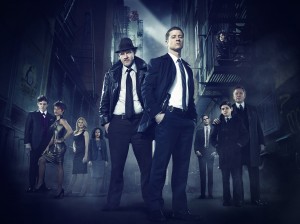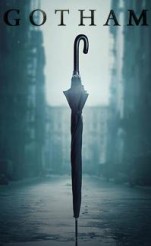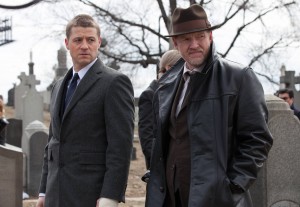
Robin Lord Taylor, Jada Pinkett Smith, Erin Richards, Zabryna Guevara, Donal Logue, Ben McKenzie, Cory Michael Smith, Camren Bicondova, David Mazouz and Sean Pertwee in GOTHAM - Season 1 | ©2014 Fox
Fox’s GOTHAM, premiering Monday, September 22 at 8 PM, depicts Bruce Wayne as a teen orphan played by David Mazouz, before he dons Batman’s cowl. This might draw comparisons to SMALLVILLE, which dramatized the early life of Superman, another DC Comics hero, but GOTHAM has a much more adult feel. Detective Jim Gordon (Ben McKenzie) – who BATMAN fans know will one day become Gotham City’s police commissioner – is at the center of the action, surrounded by people who give indications that they will someday become iconic figures in this universe, including Catwoman, the Penguin and the Riddler. Thanks to Danny Cannon’s mood-saturated direction and Bruno Heller’s sharp script, the pilot episode of GOTHAM seems much more akin to a cops and criminals show than to superhero fantasy.
Executive producer Heller developed GOTHAM as a television series from the DC comics universe that include the original creation of artist Bob Kane and writer Bill Finger, and more recent works like the several sets of feature film versions. Heller also created and executive-produces the CBS series THE MENTALIST, now entering its seventh and final season; his previous credits include the creation of HBO’s acclaimed series ROME.
At a party thrown by Fox for the Television Critics Association at West Hollywood’s Soho House, Heller sits on an outdoor couch with a gorgeous view from above of Los Angeles – not entirely unlike the view a perching Bruce Wayne might have of Gotham City – as he talks about his new venture.
ASSIGNMENT X: Did DC come to you and say, “We’d like you to run this?” or at what stage of development did you become involved with GOTHAM?
BRUNO HELLER: That’s a good question. I guess DC and Warner Bros. are in the same company, so there’s always a constant conversation between the two companies. Frankly, they’re always in development. I came in at the beginning of this, in the sense that they had zeroed in corporately on GOTHAM as a story to develop. I came in with all the rest, how to do that – how to do BATMAN without Batman. Essentially, from a cynical point of view, that’s [the premise].
AX: Kind of like SMALLVILLE?
HELLER: Well, yeah, except the money hero, so to speak, is there. With this, to me, and this is more me than the DC aspect of it, I couldn’t really do a show about superheroes, about people with those sort of powers, because I don’t really understand how to do that as a TV show.
AX: But Batman doesn’t have superpowers, he just has tools.
HELLER: Right. Exactly. And that’s why I think Batman is the most popular superhero, because he doesn’t have superpowers, he’s an ordinary human being. That’s what attracted me to that world, because it means that we can tell all of the real, true iconic BATMAN stories without resorting to magic.
AX: Was there any discussion of how DARK KNIGHT-like or not DARK KNIGHT-like GOTHAM should be?
HELLER: Not really, no. But both me and Danny Cannon had a pre[conception] – this was the beautiful thing. Danny has been thinking and visualizing that world since he was twelve. He’s an artist who started imagining that world. So his GOTHAM – our GOTHAM – comes fully formed out of Danny’s head, created long before I had talked to him, or before Christopher Nolan, or before Tim Burton, before [Joel] Schumacher, Danny had been visualizing how he would do it and what he’ll tell you is, ARKHAM ASYLUM, the video game, was for him visually [an inspiration from which] he took a great deal. Imagine Seventies New York. For me, it’s like KOJAK and THE FRENCH CONNECTION and going there when I was fourteen in 1974. So that Seventies New York, plus ARKHAM ASYLUM, plus every other BATMAN thing that’s ever been made is in there.
AX: How much did DC say, “We want to have this, this and this,” and how much did you say things like, “Let’s have Jim Gordon at the center of it, and let’s give him a partner”?
HELLER: Well, here’s the thing, and I’ve been saying this a couple of times in a day – when you think you’ve come up with an original take or a fresh notion about BATMAN or these characters, when you delve into the material, you’ll find someone has done something very close to that or near enough as makes no difference. So very early on in this process, there were a lot of things where I thought, “Oh, I’m the first person to have thought of putting this puzzle together in this way,” and then you discover other people have done it before. So although ideas occurred to me as fresh ideas, none of this is – and that’s the beautiful thing about BATMAN and the DC universe, that it’s a genuine popular culture, like everybody owns it – I don’t have any more right to create a part of the canon than anybody out there, but everybody does create the canon and has a share in dismissing or accepting what forms that. So it would be invidious of me to break down which bits of the story came from me and which were suggested. Everyone at Fox and at Warner Brothers, both individually and corporately, have their own vision of BATMAN, so it would be foolish not to listen to everybody. And there are some obvious things to include. Penguin [whose original self, Oswald Cobblepot, is played by Robin Taylor], for instance.
AX: Is the blimp we’re seeing in the advertising a Penguin blimp? It has a Penguin-ish look.
HELLER: No, that’s just Danny [Cannon]’s sense of style.
AX: The Joker is a pretty major character in the BATMAN mythos, and in some versions, he’s the one who killed Bruce Wayne’s parents. Should we look for the Joker to show up at all at some point?
HELLER: He is such a key part of the mythology that it would be cruel not to include him in the show in some way, but as you know, the sort of hard [mythology] out there is that he doesn’t really appear in the story, or in the mythical narrative, until after Batman, and it’s hard to imagine a world with Joker in the world but not Batman. So Joker will appear, but I can’t say when or how. All I can say is, it’ll be how he became the Joker, who is the man behind that mask – which is an exciting story to be able to tell. And it’ll be a great story, but I can’t say more about it than that.
AX: Should the audience be playing a guessing game of, “Maybe it’s this one, or maybe it’s that one”?
HELLER: Well, I think they can play that guessing game about all sorts of the characters, including the Joker, but as we move forward, we have to brand those characters who come in at the beginning in order to let people who don’t know that world so well, to let them know, “This is the Penguin.” You kind of have to say, for marketing terms, “All right, that’s the Penguin,” of whoever the Penguin is, “This is Catwoman.” But none of the characters that are going to turn into those classic villains know that they’re going to become those people and are not going to have those names written all over them. So the Joker and any number – Mr. Freeze, you name it, Scarecrow – we can play those games, if you like, with all of them, but …
AX: On THE MENTALIST, you’re also dealing with a main character who’s lost family – in that case, his wife and daughter – and we meet him as he’s been affected by that loss. Did doing that in any way inform doing this?
HELLER: As you’re asking [the question], I had the connection – “Oh, yeah, of course.” It didn’t catch me before, but to a degree. It’s hard to think of any story that doesn’t start out with some kind of genuine or symbolic loss; it’s becoming an adult is precisely losing your parents in some fundamental way. So all heroes lose their parents; it’s not a particular trope of mine. When I lost my parents, that’s when you really grow up, whatever stage that is in your life. So I think it’s a sort of narrative device that has powerful meaning for everybody, whether they feel it or not, it’s harder to give people parents, because that’s a complex relationship.
AX: There are flashes of great darkness in THE MENTALIST. Did you want to immerse yourself in a darker world at this point in your writing?
HELLER: No, not particularly, because then I would have insisted on doing a cable show, because that’s where darkness can really live. Here’s the thing. As dark as GOTHAM might appear, and I keep saying this in various ways, it’s the darkness of fairytales. It’s the kind of darkness that you want to live with – I hope, anyway – that children can watch, because it’s – I want to say “palatable.” I don’t mean it’s bland, I just mean it’s not darkness to freak you out, it’s darkness to make you understand that without darkness, there’s no light.
AX: And there’s a lot of humor in it.
HELLER: Yeah. And they’re comic book characters. And if you don’t hold on to that nut of the whole notion, the essential of not absurdity, but comic book nature of the notion, then you’ve lost an essence of what it’s about. It’s a comic book world. Actually, that’s a good question – was the original BATMAN comic strip meant for children or for adults? It was in the newspaper, but in the comics section. Anyway, grownups now watch stuff that in previous generations were reserved for children. Like HARRY POTTER is apparently not a children’s novel, it’s an adults’ novel as well. I don’t know what that means, but when you’re telling this kind of story, you have to play it on both levels to get that it’s for kids.
In that same way, it’s for kids today. If you showed TWILIGHT to kids when I was a kid, that would be, “Right, that’s not for kids.” The secret of TWILIGHT is – not to get into that, but that theme of chastity and violation, is taken very, very seriously in a way that it hasn’t been in real life for a long time, so it’s a way of putting that back into the cultural mix without actually having to be the prude. It’s a brilliant device.
AX: With the casting of David Mazouz as young Bruce Wayne, did Fox say, “Hey, he did TOUCH for us, take a look at him”?
HELLER: No. I didn’t know he’d been in TOUCH when I saw his tape, but he’s so much by far and away the best young actor – I mean, I’ve worked with a lot of youngsters, I’ve worked with a fair few, but he is far and away the best genuine technical and emotional actor I’ve ever come across of that age. He’s a truly great actor. He has that sort of Christian Bale level of focus, intensity and concentration and instinctive understanding of human emotions that he can’t have felt [at his age].
AX: Are you still actively involved with THE MENTALIST?
HELLER: Yeah, I’m still involved with THE MENTALIST. We have this one last season, so yeah, it was important to me and to [MENTALIST lead] Simon [Baker] that we went out together, basically. We’ve had the same writing team, pretty much, the same crew on that show from the start, so yeah, one last go.
AX: Is there anything else you’d like to say about GOTHAM right now?
HELLER: Well, here’s the thing. I’m very seldom happy with stuff I’ve done. When I see the first go, I immediately want things to be different. I think Danny produced a visual masterpiece and I hope people agree, because I think it’s the best work he’s ever done and I’m really proud to have been part of the process and I think a number of people have done their best work on this thing, so I hope that a wide audience agrees.
Related:TV Review: GOTHAM – Season 1 – “Pilot” – Series Premiere
Related:Interview with SLEEPY HOLLOW Executive Producers Mark Goffman and Heather Kadin on Season 2
Related: Exclusive nterview with SCORPION executive producer Roberto Orci
Follow us on Twitter at ASSIGNMENT X
Fan us on Facebook at ASSIGNMENT X
Article Source:Assignment X
Article: Exclusive nterview with GOTHAM creator Bruno Heller on Season 1 of young Batman
Related Posts:












